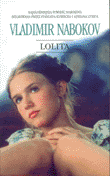
One of my favorite books, and one of the best to discuss, is Nabokov's Lolita. It's both creepy and beautiful. I read this article at NPR, which described one of the great traits of Lolita being the readers complicity in the actions of Humbert Humbert. Like Richard III. There's nothing like getting the inside scoop from the bad guys, and being forced to go along with them, even sympathize. Even empathize. It's a great novel, and a polarizing novel. And it never seems to leave literary news alone.
P.S. Has any book had as many great covers as Lolita?
16 comments:
Until I read "Reading Lolita in Teran" I thought that "Lolita" was a creepy book about a pervert. But then I realized how much of a metaphor the book is for instances of oppression and it completely altered my whole view. And now, I wholeheartedly admit, that "Lolita" is really an amazing novel, the really allows the reader to see how horrifc situations of oppression can be. We have a much more emotional response when we hear about a little girl being molested by her step-daddy than we do when we hear about Pol Pot sending people with glasses out into the fields. Do we not?
I read "reading Lolita in Tehran" and then realized it probably would have been a good idea to read Lolita first. I'm know I missed out on much of the meaning of the book by not having a reference.
Per your writings, I'm on my way to the library right now to check out both Lolita and Reading Lolita in Tehran. I'll be reading them on a beach in front of my little cousins - is that too creepy?
only if you give them lolipops... did i go to far?
Speaking of Lolita, AZF, have you made any more trips to the library?
I agree with the Z-Fs, this is a completely captivating book, more about power and complicity/resistance than sex or anything else (as already stated). I didn't love Reading Lolita in Tehran, though. Or, I should qualify that by saying-- I thought there were some maybe provocative theories of literature, power, and politics and the relationships between them. But it was far too long and I felt like it kept reiterating the same thing over and over and over again.
Yes, well you are probably right about that. I didn't make it past the Lolita section. I felt like she couldn't pick a direction. Story, character, philosophy...if she had just picked a direction(!!!)...as a result she repeated herself a lot, which made it old very quick.
Revelation!
It is to be assumed that I am behind the times and that perhaps every one and their baby’s mama’s drama’s has already understood this. In any case I have to talk. Or have I talked about this before?
For a long time I had been perplexed about the difference between philosophy and literature. Much anxiety has happened. Even to the dreadful summit of the cliff that beetles over its base into the sea, where I stood very nearly rescinding literature in light of that much more pragmatic, efficient discourse, philosophy. However I have been saved.
This is how: I have come to realize Literature must be read.
That is, the action of reading is necessary for literature. In other words literature is not directly pragmatic. Or to say: literature is not a means to an end. Literature is the end. There is a difference between sympathy/pathos and understanding/application/discourse. Hegel, for instance, wishes to be understood and argued with. Melville wishes to be read. Melville cannot be reduced. Hegel can and perhaps must be reduced. I can come away from Hegel with Hegel. But Moby Dick remains Moby Dick. This irreducibility, I believe, resides in pathos. I can read books about Hegel and understand Hegel. I can read books about Moby Dick and still never understand Moby Dick.
certainly I am not denying literature is a kind of discourse. There is a transmission. But my question is: transmission of what?
I have always been offended when someone uses an image or example from literature in some rhetorical way to aid in understanding his or her philosophical point. I am tempted, even to say that this kind of ‘transmission’ is a calumny to the literature. Slander and libel. A reduction that renders the work if not meaningless then at least lessened in meaning.
Please speak to me. Is any of this correct?
of course i have broken my own law earlier by paraphrasing hamlet.
'Moby Dick remains Moby Dick' is perhaps better said by saying Moby Dick remains in Moby Dick. Philosophy requires me to understand the system, to take from the text, to retain the theses and precepts which uphold the system. Literature does not.
Last night at the bar, Alex had along The Great Gatsby. I was vindictive and contemptuous, believing that long ago when I had read it, I had sounded the depths. Of course reading exerpts of it in the bar brought to mind three necessary conclusions.
1: Reading, the action of reading literature, of reading paragraphs in sequence is enjoyable. This joy is specific to the spell, the witchcraft of the immediate experience of reading.
2: My notion that somehow i had retained or kept some of the great gatsby, that I understood it, that i knew it, is a lie.
3: Which is to say, we do not (explicitly) understand literature. We experience it. Like we experience a carcrash, or a mountain, or god.
All of this polemic is to say only this:
literature is, unlike philosophy, essentially, necessarily ineffable.
Pynchon has a new book coming out in December and you didn't even mention it.
it was in the works since yesterday, diedan
Here are some links that I believe will be interested
I like it! Keep up the good work. Thanks for sharing this wonderful site with us.
»
Post a Comment